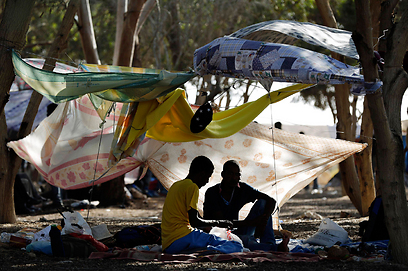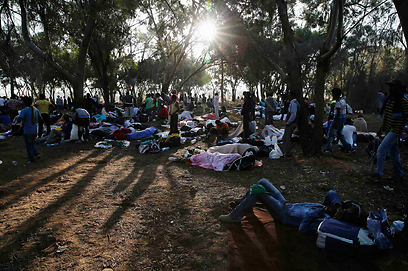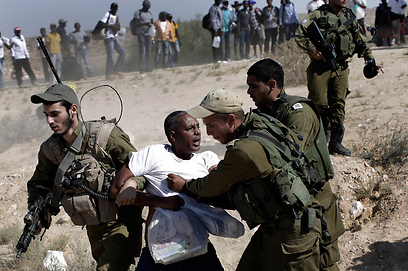
Migrants' desert camp
Photo: Reuters
About 1,000 African migrants have marched out of an Israeli detention center in protest at their treatment and are camped out by the border after the IDF prevented them from crossing into Egypt, migrant activists said Sunday.
The Eritrean and Sudanese migrants left the Holot open detention facility Friday, saying Israel has not processed their claims for asylum. The migrants are imploring the UN to help resettle them elsewhere.
"We cannot continue living in a cage in the desert, with no release date and no judicial review," migrant activists said in a statement.
The army had no immediate comment.
About 50,000 Africans have poured into Israel in recent years from Egypt. The Africans say they are fleeing persecution and danger. Israel says many are looking for employment.
Some believe Israel's history as a refuge for Holocaust survivors compels it to help the downtrodden. Others fear taking in so many Africans will threaten the country's Jewish character.
Israel has struggled with how to deal with the African migrants. It constructed a fence along its 220-kilometer (130-mile) border with Egypt, offered cash to migrants to return home, reached out to other countries to take them in and in many cases detained them.
Some 2,300 people are held at the open Holot detention center in a remote desert location. They can come and go, but they must sign in several times a day and sleep there, making it impossible for them to stray far from the remote facility or hold jobs. Those who violate the rules, or reject what Israel calls "invitations" to report there, can be sent to a nearby prison.
Israel does not deport the migrants because they could face danger in their conflict-ridden homelands. But critics charge that Israel's policies make migrants feel coerced to leave. They also accuse Israel of dragging its feet on reviewing the migrants' claims for refugee status.


















